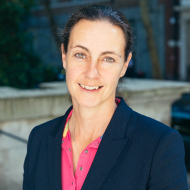Revised CPD policy announced

RCVS director of education, Dr Linda Prescott-Clements
Following concerns raised by veterinary professionals regarding the RCVS’ upcoming transition to an annual continuing professional development (CPD) requirement, the College has made two key additions to its CPD policy to address feedback and support veterinary surgeons and VNs through this transition.
These additions aim to address the shift to annual hourly requirements from January 2020, with veterinary surgeons required to complete 35 hours of CPD each calendar year and veterinary nurses required to complete 15 hours. This replaces the previous requirement of 105 hours and 45 hours of CPD over a rolling three-year period for veterinary surgeons and veterinary nurses respectively.
The shift to annual hourly requirements has been made to ensure that every vet and VN achieves their CPD targets each year, simplifying the hourly requirement, in addition to allowing the RCVS to address non-compliance in a meaningful way. The switch to annual hours will also take vets’ and VNs’ personal circumstances into account and a degree of flexibility has been built into the system to recognise this need.
The first of the two new additions is the option for vets and VNs to take a ‘CPD pause’, which aims to address some of the feedback the College received about the need to consider personal circumstances. In practice, this means that, for planned periods away from work, such as parental leave, and exceptional circumstances, such as serious ill health or unforeseen changes to family responsibilities, vets and VNs can pause their CPD for up to six months without the need to make up the hours when they return to work. This will, therefore, reduce the burden on vets and VNs returning to work after a break and makes it clear what the requirements are for each year.
The second change is that the RCVS will allow vets and VNs to carry over some of the CPD hours they have accrued in 2019 into 2020, to smooth the transition to an annual hourly requirement. Vets will be allowed to carry over 25 hours and VNs 10 hours of accumulated CPD from 2019 through to 2020. This will apply once, in 2020 only, and is only applicable to vets and VNs who have been CPD-compliant from 2017 to 2019 and have a surplus number of hours to carry over.
The other significant change coming to the College’s CPD policy in 2020 is the introduction of a new CPD recording platform, with the working title 1CPD. The platform, an app for VNs and vet surgeons to record their CPD, will be launched in January 2020, and will support the new outcomes-based, reflective approach to CPD. 1CPD will replace the existing Professional Development Record (PDR), at which all content from the PDR will automatically be exported over to 1CPD.
The new platform will also aim to facilitate the move to individuals reflecting on the impact of the CPD they have undertaken, to drive the outcomes-based approach that will be recommended in January 2020, and become mandatory in January 2022. This approach aims to support positive CPD outcomes by encouraging professionals to reflect on what they have learned, how they will apply their learning and how it will improve their practice.
“The process of reflection is particularly important as it facilitates a culture of actively looking for ways to improve,” says RCVS director of education, Dr Linda Prescott-Clements. “Our new tool will support this reflection in a fast, effective and cost-free way. It’s really important for us to get this point across – CPD is incredibly important for a flourishing profession but it doesn’t need to be expensive, stressful or demanding.”



 The RCVS has announced a new version of its 1CPD mobile app, with enhanced features for veterinary surgeons and veterinary nurses to record their continuing professional development.
The RCVS has announced a new version of its 1CPD mobile app, with enhanced features for veterinary surgeons and veterinary nurses to record their continuing professional development.